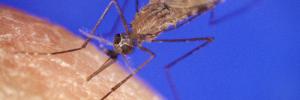
Fight against deadly malaria parasite: New drug target identified
- Malaria caused by Plasmodium falciparum parasites remain the deadliest form of malaria, and it remains a significant global health challenge
- New research from Stellenbosch University shows that three small, highly specialized proteins in P. falciparum play a critical role in the parasite’s survival across its complicated life cycle.
- Disrupting those three proteins could significantly impact on the parasite’s ability to survive and propagate
The secret to the malaria parasite’s ability to survive in both its mosquito and human hosts – with temperatures varying from 22˚C in the mosquito to a feverish 42 ˚C in humans – may also prove to be its downfall.
Malaria caused by Plasmodium falciparum parasites remain the deadliest form of malaria, and it remains a significant global health challenge as the parasite is increasingly becoming resistant to existing drugs.
Now research from Stellenbosch University (SU), published in The Protein Journal, has shown that three very small, but highly specialized, proteins in P. falciparum play a critical role in the parasite’s survival across its complicated life cycle. Disrupting those three proteins could therefore significantly impact on the parasite’s ability to survive and propagate.
This is the first time that the proteins, called ‘small heat shock proteins’ (or Hsp20s’, based on their molecular weight) have been comprehensively characterized in terms of their biochemistry and function in the P. falciparum parasite.
Dr Tawanda Zininga, a biochemist from SU’s Department of Biochemistry and lead author on the article, says across all life forms heat shock proteins play a critical regulating role as “chaperones”, helping other proteins to maintain their specific functionality in physiologically challenging environments. To date, however, the smaller heat shock proteins have been overlooked in favor of their larger peers.
“Recent research has revealed that Hsp20s play a critical role in protein quality control within the cell, particularly under stress conditions, making them increasingly relevant as potential drug targets,” he explains.
In the case of the P. falciparum parasite, his research has now also shown that its Hsp20s are performing far better than its larger counterparts. “Unlike the major larger heat shock proteins, the Hsp20s in the malaria parasite can function independently from external energy sources. In other words, while energy-dependent chaperones may otherwise be impaired under energy-depleted, high-stress conditions, the parasite’s Hsp20s remain active.
“Because they serve as the final defense against protein misfolding and aggregation, especially during cellular stress, targeting Hsp20s may provide a novel and effective approach to disrupting parasite survival,” he explains.
Dr Zininga and his MSc student, Francisca Magum Timothy, also found that quercetin inhibited the chaperone function of the malaria parasite’s Hsp20s, although further studies will be needed to establish a direct causal relationship. Quercetin is a natural product that occurs in certain fruits and vegetables, and is well-known for its antioxidant, anti-inflammatory, and anticancer properties.
In 2023, Francisca was awarded a Mandela Rhodes Scholarship to complete her MSc at Stellenbosch University. She is also a member of the Young African Leaders Initiative (YALI) and an African ChangeMaker fellow.
The article titled “Comparative characterization of Plasmodium falciparum small heat shock proteins and their inhibition by Quercetin (3,3’,4’,5,7-Pentahydroxyflavone)” was published in The Protein Journal.



